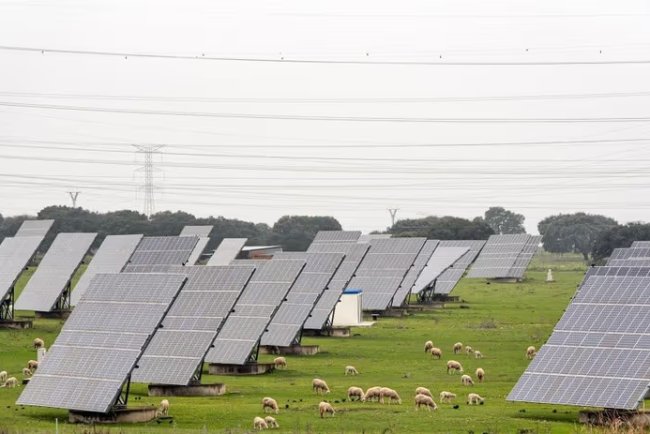US Shifts Focus: Energy Expansion Over Net-Zero Goals, Chris Wright Announces

US Energy Department Will Stress Energy Production, Increased Oil Supplies in New Contract to Be Completed
Under a newly finalized order of the US Energy Secretary Chris Wright, the US Energy Department will focus on increased energy production and the hardiness of its grid. The newly finalized order of the US Energy Department, according to sources, does not comply with former President Donald Trump's policy that was based on the enhancement of the production of fossil fuel but is contrary to new scenarios for witnessing reduction in greenhouse gases. Two days after his inauguration as president, this executive order signed places more emphasis on abundance in energy than achieving net-zero emissions.
A harsh reflection of this is the wider policy of the Trump administration - increasing U.S. energy dominance toward securing American energy independence. In this sense, the new approach pursued by the DOE would look at an expansion of fossil fuel production, strengthening nuclear energy, and replenishing this country's crude oil reserves.
Wright said the department in his first order as Energy Secretary will focus on ramping up energy production in the United States, making the country a leader in fossil fuel and energy production. He said that policies stressing net-zero emissions will increase energy costs for businesses and households and could even harm energy system reliability and national security. He further attacked such policies for crippling America's ability to maintain energy security.
That is a significant break from the policies of the previous administration under the leadership of President Joe Biden, who had made lofty climate targets. Among them is a target of net-zero by 2050. He was also advocating for the reduction of greenhouse gas emissions to around 61-66% in 2035 levels against 2005 levels. His policies shifted to be more involved in the expansion of electric vehicle adoption and clean energy as the way to take down fossil fuel dependence.
However, under the new secretary of energy Mr. Wright administration, the DOE plans to fill up the oil, natural gas, and nuclear power in the country. This is among the restocking attempts into the SPR which had been depleted by high fuel prices and other ways of disrupting supply chains, significantly due to the Russia-Ukraine war that continues under Biden. DOE will restock additional amounts of oil for the nation, as energy globally and at home is increasingly uncertain and with expensive oil.
The second one is the reinforcement of America's power grid, which faces extreme weather conditions and very fast-aging infrastructures. Biden's administration had already begun its movement toward the modernization of the grid, but with instructions from Wright it concentrated on rapid energy production and increased infrastructures.
As the DOE adopts this new approach, it focuses very much on nuclear energy as one of the integral components of the energy mix of the United States. Further development of nuclear capacity can further strengthen a steady and low-carbon source of energy that ensures stability in the grid but reduces dependency on fossil fuel over the long term. Although nuclear energy is cleaner than coal and natural gas, it is still the most expensive and controversial method both in public perception and construction.
Some of Biden's measures on climate change are re-entry into the Paris Climate Agreement and giving gigantic incentives to use renewable sources of energy. However, deregulation policies during the Trump period and a necessity to produce more fossil fuels resulted in having an open gap between the two administrations regarding their energy policies. The Biden administration would wish to spend more on green technologies while reducing carbon footprints, but the Trump administration's policies are energy-related and intend to maximize domestic oil and gas productions that can fuel economic growth.
This new DOE priority may therefore also indicate a shift toward energy policies which will still remain friendly to consumption of oil and natural gas, but decrease entry into wind energy and solar for the foreseeable period. Among them will now also be the reappraisal of policies designed towards the transition for renewable energies with the reviewing leases on issues in the contested area of wind energy.
The most prominent feature of the order is a call to lower regulatory barriers for energy production. The government of former President Trump rolled back most of the regulations aimed at checking emissions from oil and gas companies. Wright's order signals a continuation of the deregulation trend, making it easier for energy producers to access resources and increase production to match the growing demand for energy in the country.
This aside, the DOE order does not mention any steps or timelines regarding how these lofty goals will be achieved. There is no detailed plan on how the U.S. government will expand fossil fuel output or strengthen the grid in practice. However, the broad directives suggest that energy policies will be more focused on immediate production and infrastructure improvements.
Conclusion:It just suggests that the conversations are being led over the bright future of America's energy horizons and on how the yawning gap, with every passage of time between the push toward green technology versus energy security and stability gets to be very visible. Meanwhile, when American continues to try and meet all of its energy needs, there will be broad determinations within the DOE which dictate the course from here on down in U.S. energy policy for years and decades to come.
These current efforts appear to be based on energy production and national security concerns. Activities by the DOE, such as restocking its oil supplies, building resilience to its grids, and pushing forward fossil fuel and nuclear energy production, may represent a point of change in the U.S. debate over energy policy.
Source: Reuters
What's Your Reaction?

















